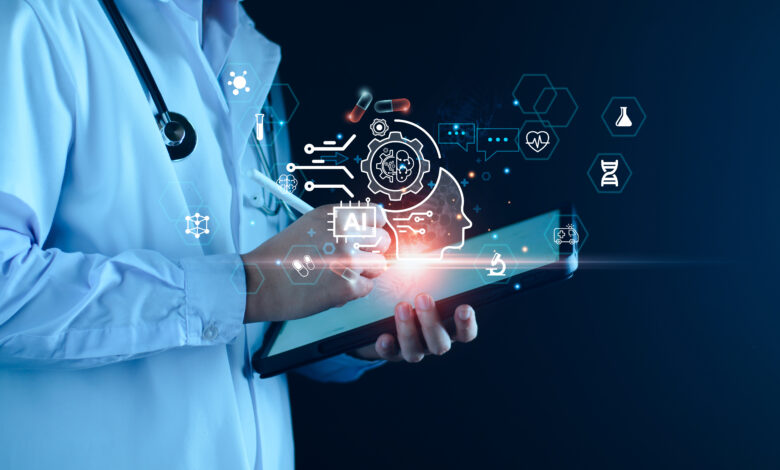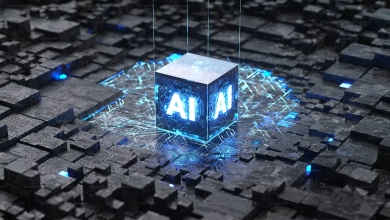
Artificial intelligence is shaking up healthcare, bringing a wave of efficiency, accuracy, and personalization that’s changing the game for doctors and patients alike. AI isn’t just about automation; it’s a powerful tool that redefines how we diagnose diseases, discover life-saving drugs, and tailor treatments to individuals. From catching cancer earlier to creating customized medications based on your DNA, AI is making medicine more precise and proactive. And let’s be clear—this isn’t about replacing doctors. It’s about giving them the best possible tools to do what they do best: save lives.
Advancements in Diagnosis
AI’s ability to crunch vast amounts of medical data is revolutionizing diagnostics. AI-powered tools now detect diseases like cancer, Alzheimer’s, and cardiovascular conditions accurately, often outperforming human doctors. Trained on massive datasets of medical images, AI can spot anomalies that even the most experienced radiologists might miss. Imagine a radiology tool that can pinpoint lung nodules or detect breast cancer in mammograms before traditional methods ever could—early detection like this drastically improves survival rates and treatment success.
Doctors and radiologists work insane hours, and fatigue can lead to errors. AI steps in as a second set of eyes, reducing misdiagnoses and ensuring patient safety. And it’s not just about scanning images—AI-driven transcription services take over administrative tasks like note-taking, freeing up doctors to spend more time with patients instead of drowning in paperwork. AI doesn’t just streamline efficiency; it transforms healthcare into a more patient-focused industry.
Then, there’s the rise of virtual assistants and AI chatbots. These tools are already changing how patients interact with healthcare, helping with symptom checks, appointment scheduling, and triage. With telemedicine booming since COVID-19, AI is making remote healthcare more accessible than ever. Virtual assistants can offer 24/7 support, flag high-risk patients, and even recommend the next steps before a doctor steps in.
The future of patient care is looking more connected and responsive than ever. However, as AI takes on a bigger role in healthcare, the rise of deepfake technology poses serious risks—something we’ll explore later in this article.
Drug Discovery and Development
Bringing a new drug to market typically takes years and costs billions. AI is speeding up the process with predictive analytics and molecular modeling. AI can simulate how proteins interact with different compounds, dramatically reducing the time needed for drug discovery. One game-changing example is Google’s AlphaFold, which accurately predicts protein structures—something that used to take scientists years. With AI, researchers can model drug interactions and fast-track promising candidates, cutting costs and accelerating breakthroughs.
AI isn’t just helping create new drugs—it’s also finding new uses for existing ones. During the COVID-19 pandemic, AI analyzed vast datasets to identify drugs with potential antiviral properties, leading to faster treatment options. AI combs through clinical trial data, scientific literature, and patient records at a scale no human team could match, revealing new therapeutic possibilities that might otherwise go unnoticed.
AI is also tackling one of the biggest challenges in drug development: clinical trials. Recruiting the right patients for trials is often slow and expensive, but AI can quickly match eligible candidates based on genetic markers and medical history. This ensures trials run more efficiently and patients receive potentially life-saving treatments sooner. AI can even predict trial outcomes by analyzing previous studies and patient data, helping pharmaceutical companies make smarter, data-driven decisions.
Personalized Medicine
Traditional medicine has always followed a one-size-fits-all model. AI is flipping that on its head, enabling personalized treatments based on an individual’s genetic makeup. Imagine walking into a doctor’s office and receiving a treatment plan customized to your DNA. Instead of prescribing the same chemotherapy drug to all cancer patients, AI can determine which treatment will work best for each person, minimizing side effects and maximizing effectiveness.
The future of medicine could even include AI-designed vaccines tailored to an individual’s genetic structure. This level of precision could make vaccines more effective and reduce adverse reactions. However, personalized medicine isn’t just about treatment but also prevention. AI can analyze your lifestyle, genetics, and biomarkers to predict potential health risks and recommend proactive steps to keep you healthy. Whether it’s personalized diet recommendations or early warnings for diseases like diabetes and heart conditions, AI is moving healthcare from reactive treatment to proactive prevention.
Ethical Considerations and Data Privacy
As AI takes a more significant role in healthcare, ethical concerns around data privacy and patient safety must be addressed. AI systems rely on massive amounts of personal health data, making them prime targets for cyberattacks. Hospitals and healthcare providers must enforce strict security measures and be transparent about how their AI models are built and used. Patients need clear control over their data, with the ability to opt out if they choose.
Bias in AI is another major concern. AI models trained on non-diverse datasets can produce biased predictions disproportionately affecting certain populations. Healthcare organizations must actively work to eliminate bias, ensuring fair and equitable treatment for all patients. This means using diverse datasets, regularly auditing AI systems, and involving a broad range of experts in AI development.
And let’s not forget—AI is here to assist, not replace, healthcare professionals. The goal isn’t to remove human decision-making but to enhance it. AI can provide insights and recommendations, but human doctors will always be critical in ensuring those decisions are ethical, accurate, and in the patient’s best interest.
Preparing Healthcare Professionals for the AI Shift
Despite AI’s rapid advancements, healthcare professionals aren’t receiving enough training on how to use these transformative tools. Medical schools and hospitals must integrate AI education into their programs, ensuring that doctors, nurses, and researchers can effectively leverage AI for better patient outcomes. Companies like Google are already investing in AI-driven medical technology, with tools like Med-Gemini and AlphaFold leading the charge. But for AI to truly revolutionize medicine, healthcare providers need hands-on experience and the right training. Without proper education, AI’s potential to enhance diagnostics, streamline workflows, and improve patient care may go unrealized.
While AI has the potential to revolutionize healthcare, it also presents serious risks—especially when it falls into the wrong hands. One of the most alarming trends is the rise of AI-generated “doctors” spreading fake medical advice online. Deepfake AI avatars, particularly on platforms like TikTok, are masquerading as real healthcare professionals in fields such as gynecology, nutrition, and plastic surgery. These hyper-realistic AI-generated personas look convincing but have no real expertise, misleading people with inaccurate or even dangerous health information. Some operate across multiple accounts, deceiving audiences on a large scale, while others push sketchy wellness products or spread fake celebrity gossip under the guise of medical authority.
This flood of AI-generated misinformation could have devastating consequences, from promoting unsafe medical practices to eroding public trust in real healthcare professionals. As AI continues to reshape medicine, it is critical to implement strict regulations and develop AI-powered fact-checking tools to combat the spread of false health claims. The future of AI in healthcare depends not only on innovation but also on ensuring that medical information remains accurate, ethical, and in the hands of real experts. To counteract misinformation, doctors, hospitals, and administrative staff should develop a habit of actively monitoring social media, identifying false claims, and providing patients with reliable, science-backed information to protect public health.
Looking Ahead: The Future of AI in Healthcare
Over the next three to five years, AI will continue expanding its role in healthcare, primarily as a supportive and supplemental tool. AI-powered diagnostics, smart hospitals, and fully personalized medicine are on the horizon. By automating administrative tasks, detecting diseases earlier, and optimizing treatments, AI will allow doctors to shift their focus toward preventive care rather than simply reacting to and treating symptoms. Furthermore, AI’s ability to accelerate medical research will speed up the discovery of cures for a vast number of health issues we face today.
Beyond hospitals, AI will reshape healthcare in ways we may not yet fully appreciate. One of the biggest reasons for hospital visits is car accidents, but in the future, smart AI-powered vehicles will dramatically reduce collisions, easing the strain on emergency rooms, lowering insurance rates, and allowing doctors to focus on preventative care, ultimately creating a more efficient healthcare system. AI’s integration into both medicine and everyday life represents a holistic solution, one that not only improves patient care but also helps prevent injuries and illnesses before they occur.
The future of healthcare is AI-driven, and its success will depend on ethical development, proper training, and strong data security. If implemented correctly, AI will make medicine more precise, efficient, and personalized than ever before. The revolution is already happening—now it’s about ensuring we use AI to build a healthier, safer world for everyone.



